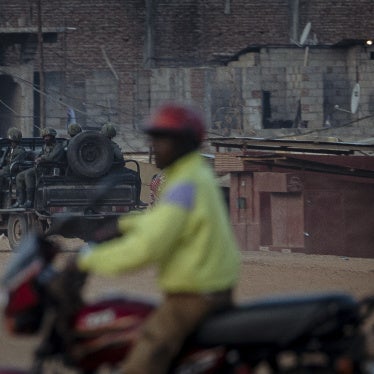(Rabat) – Morocco is prosecuting activists who campaigned peacefully for a boycott of elections held three months ago, Human Rights Watch said today. These prosecutions contradict statements by Moroccan officials that authorities arrested no one for advocating a boycott.
One of several such trials resumes on February 22, 2012, before the Marrakesh First Degree Court. Charged with distributing fliers in violation of the law, the defendants were arrested in Marrakesh on November 16 and 17, 2011, as they began handing out fliers urging Moroccans to boycott the legislative elections on November 25. Another group of pro-boycott leafletters are on trial already in the city of Benguerir.
“The prosecution of pro-boycott campaigners underscores the gap that Morocco needs to close between its new, rights-embracing constitution and continuing repressive practices,” said Sarah Leah Whitson, Middle East and North Africa director at Human Rights Watch.
Human Rights Watch published evidenceon November 23 that police around the country had summoned more than 100 people for questioning since October because of their distribution of pro-boycott leaflets or other efforts to urge voters not to cast a ballot. Boycott advocates argued that the palace-led reforms announced since the start of pro-reform street protests in Morocco on February 20, 2011, did not go far enough to enhance the separation of powers and curb royal prerogatives.
On November 24, the Interior Ministry wrote a letter to Human Rights Watch to deny its allegations, saying they were based on statements “of doubtful credibility” and referring to a government statement dated November 20 that no one had been arrested for urging a boycott.
Abdelouahid Kanin, a Marrakesh resident who, along with Moustapha Ourchid, faces trial on February 22, described how Marrakesh police arrested him and colleagues just a few days before the government issued its denial.
On November 16 [2011], we gathered in Bab Doukala [in Marrakesh]. There were about 30 of us, from the 20 February Movement [Morocco’s youth-led pro-reform movement], en-Nahj Dimuqrati [the Democratic Path, a far-left party] the PSU and the PADS [Parti Socialiste Unifié and the Parti de l’Avant Garde Démocratique Socialiste, both leftist parties]. We chanted slogans, and no one bothered us, but when we tried to distribute tracts calling for boycott, the police moved in. They arrested 10 of us: myself and another from an-Nahj, 3 from al-Adl wa’l Ihsan [Justice and Spirituality, an Islamist movement], three Amazigh rights activists, and two from the 20 February movement.
The police questioned us for about three hours, mainly about our political affiliations and why we were handing out the leaflets. At the end, they had us sign our statements and freed us. The next day we went out to distribute leaflets again and the police arrested two of us again, along with four more persons.
Among those arrested with Kanin and Ourchid on November 16 are Ilyas Alkhadiri and Ismail Mechmach, who face a separate trial on the same charge. Two of those arrested on November 17, Wael Nassih and Mohamed Oubaha, are defendants in a third trial on the same charges. All the defendants are at liberty.
The six men have been charged under article 2 of Morocco’s press code, which imposes a fine of between 2,000 and 15,000 dirhams (US$233 - $1,752) for distribution of written material that does not bear the name and address of the printer.
Moroccan human rights activists point out that citizens regularly distribute fliers to passers-by on political and other matters without police interference, even when those fliers do not list who printed them. The prosecution in these cases of fliers with a political message appears selective, Human Rights Watch said.
“Arresting and prosecuting advocates of a peaceful boycott is little different from arresting backers of one party or another,” Whitson said.








